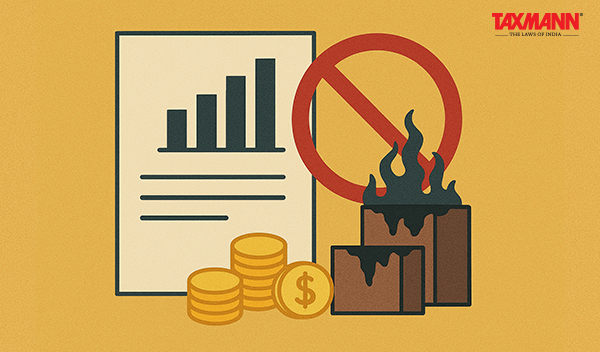ITC Reversal | AAAR Blocks Credit on Fire-Destroyed Goods
- Blog|News|GST & Customs|
- 2 Min Read
- By Taxmann
- |
- Last Updated on 15 May, 2025

Case Details: Geekay Wires Ltd., In re - [2025] 173 taxmann.com 958 (AAAR-TELANGANA)
Judiciary and Counsel Details
- Sandeep Prakash & S.A.M. Rizvi, Member
Facts of the Case
The appellant, a registered manufacturer, had availed input tax credit (ITC) on inputs used in the manufacture of finished goods, specifically steel nails. These finished goods were subsequently destroyed in a fire accident. Following this incident, the jurisdictional authority questioned the eligibility of ITC claimed on the inputs that were consumed in the production of such destroyed finished goods.
The assessee submitted that the inputs were not themselves lost or destroyed, but were used in the manufacturing process prior to the incident, and therefore ITC should not be denied. The dispute was initially raised before the Authority for Advance Ruling (AAR), which ruled against the appellant. Aggrieved, the appellant, preferred an appeal before the Telangana Appellate Authority for Advance Ruling (AAAR) seeking reversal of the AAR’s decision and reasserting the admissibility of ITC.
AAAR Held
The Telangana AAAR held that input tax credit on inputs used in the manufacture of finished goods that were subsequently destroyed by fire is inadmissible under Section 17(5)(h) of the CGST Act. The Authority observed that the legislative intent behind Section 17(5)(h) is clear, as it explicitly blocks ITC in respect of goods lost, stolen, destroyed, written off, or disposed of by way of gift or free samples. It was emphasized that the provision makes no distinction between the destruction of inputs themselves or destruction of goods in which such inputs were used. Accordingly, once the finished goods—into which the inputs were integrated—are destroyed, the benefit of ITC on those inputs stands defeated.
List of Cases Reviewed
- General Manager Ordnance Factory Bhandara, In re [2019] 106 taxmann.com 246/26 GSTL 423 (AAR-MAHARASHTRA) (para 14) affirmed
List of Cases Referred to
- General Manager Ordnance Factory Bhandara, In re [2019] 106 taxmann.com 246/26 GSTL 423 (AAR – MAHARASHTRA) (para 9 and 13.1)
- Ashok Lanka v. Rishi Dixit (2005) 5 SCC 589 (para 11)
- UCO Bank v. Rajendralal (2008) 5 SCC 257 (para 11).
Disclaimer: The content/information published on the website is only for general information of the user and shall not be construed as legal advice. While the Taxmann has exercised reasonable efforts to ensure the veracity of information/content published, Taxmann shall be under no liability in any manner whatsoever for incorrect information, if any.

Taxmann Publications has a dedicated in-house Research & Editorial Team. This team consists of a team of Chartered Accountants, Company Secretaries, and Lawyers. This team works under the guidance and supervision of editor-in-chief Mr Rakesh Bhargava.
The Research and Editorial Team is responsible for developing reliable and accurate content for the readers. The team follows the six-sigma approach to achieve the benchmark of zero error in its publications and research platforms. The team ensures that the following publication guidelines are thoroughly followed while developing the content:
- The statutory material is obtained only from the authorized and reliable sources
- All the latest developments in the judicial and legislative fields are covered
- Prepare the analytical write-ups on current, controversial, and important issues to help the readers to understand the concept and its implications
- Every content published by Taxmann is complete, accurate and lucid
- All evidence-based statements are supported with proper reference to Section, Circular No., Notification No. or citations
- The golden rules of grammar, style and consistency are thoroughly followed
- Font and size that’s easy to read and remain consistent across all imprint and digital publications are applied



 CA | CS | CMA
CA | CS | CMA
